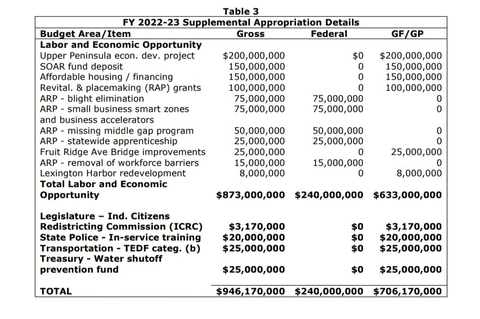Lawmakers spend a quick $706M of Michigan’s money
More than half the money, $450M, will be spent on state-funded economic development plans
In a single bill, in its first month and without the benefit of a single hearing or word of testimony, the 102nd Michigan Legislature agreed to spend about $946 million for 2023.
Senate Bill 7 was introduced by Sen. Sarah Anthony, D-Lansing.
Of that, about $706 million is raised from state taxpayers. The rest is federal money.
More than half of the state share, or $450 million, will be spent picking winners and losers via economic development officials.
- $200 million “for a grant to be awarded to a business in Delta County for an economic development project.”
- $150 million to be deposited in the Strategic Outreach and Attraction Reserve Fund, or SOAR.
The $200 million is for an Escanaba paper mill. It comes without any requirement that the company add employees, says James Hohman, the Mackinac Center’s director of fiscal policy. The only requirement is that the company’s headcount be frozen in time from Oct. 1, 2022, for a decade forward.
Senate Bill 7 also sends $150 million to SOAR, a fund Michigan uses to hand out grants to preferred businesses.
The results of that strategy are mixed, at best. Last year, Ford Motor Co. received a $100 million SOAR grant to hire 3,030 factory workers. Two months later, it laid off 3,000 white-collar workers, many of them in Michigan.
As the Mackinac Center’s Jarrett Skorup wrote previously in CapCon:
The most comprehensive analysis of Michigan select incentive programs found that job announcements rarely turn into jobs. Fewer than 20% of the jobs promised when new deals are made public come into existence.
Only 2.3% of deals produce as many jobs as advertised.
“It just doesn’t work,” Hohman says. “We have the biggest, most active business subsidy regime in the country. We are 13th-worst for job growth. There’s a belief that anything you can do for jobs is a good thing. But these programs don’t deliver what politicians say they deliver.”
Another $150 million in Senate Bill 7 will fund grants for housing, and $100 million is for “revitalization and placemaking grants.” Another $33 million will be spent between a bridge project ($25 million) and a harbor redevelopment ($8 million) project. All told, the state will spend $633 million on economic development projects as a result of SB 7.
The legislation spends another $73 million of state money in the following ways:
- $25 million to create a water shutoff prevention fund
- $25 million for “projects for construction or preservation of streets in cities and villages with populations of 10,000 or less, including, but not limited to, reconstruction, replacement, rehabilitation, and capital preventive maintenance.”
- $20 million for Michigan State Police in-service training
- $3.17 million for legal costs for the Michigan Independent Redistricting Commission
Michigan Capitol Confidential is the news source produced by the Mackinac Center for Public Policy. Michigan Capitol Confidential reports with a free-market news perspective.


